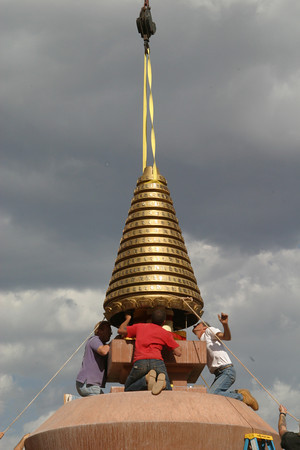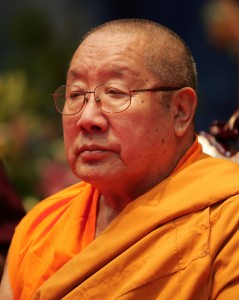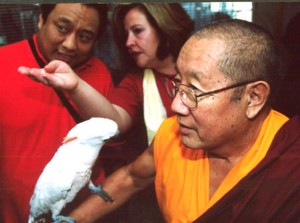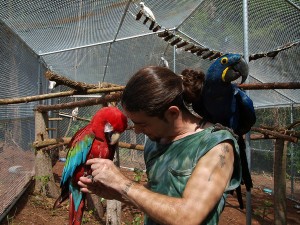The following is a video teaching recorded live at Kunzang Palyul Choling:
compassionate activity
Cultivating Compassion – A “How To”
The following is an excerpt from a teaching by Jetsunma Ahkon Lhamo called “The Foundation of Bodhicitta”
Now it sounds like I’m making a sales pitch. “You too can do this.” Well in a sense, I am. But what I’m really trying to do is to open your eyes to the potential here. Please don’t let me express this in such a way as to indicate to you that it is easy. All you have to do is practice a little Dharma and bingo you have got it. The kind of offering that I’m talking about, the kind of bodhicitta, the kind of generosity that I’m talking about takes a life time and more of absolute and total commitment to practice,. of actually practicing sincerely for the benefit of sentient beings; but only under that condition can you offer the ultimate gift—the gift of enlightenment. In cyclic existence, there is no end to suffering. The only end to suffering is one exits cyclic existence; and one only exits the cycle of death and rebirth upon achieving enlightenment. How can you help others to achieve enlightenment? Well, you can’t until you yourself have achieved some enlightenment.
In the meantime, you can help build stupas; you can make tsa tsas; you can sponsor enlightened activity; you can support your temple. You can do all of those things. You can practice, and you can dedicate the virtue of your practice to the liberation and salvation of all sentient beings. That is a very significant gift. That is a very significant act of bodhicitta. But ultimately the true benefit comes when you yourself have achieved realization in order to benefit sentient beings; and that you are able to return in such a form that you can provide the path and provide the method. You can provide the impetus. You can provide the empowerment and the fertilization that is necessary in order to ripen each and every sentient being’s buddha seed so that it can bring forth the flower of enlightenment.
It is not a selfish goal. It is not an immediate end to the suffering of sentient beings so you might fall into the trap of thinking, ‘Well what is the kindest thing to do? Practice to beat the band or work in a soup kitchen.’ Now we are taught that working in a soup kitchen would be the most compassionate thing to do, but actually it is two different kinds of compassion, you see. Working in a soup kitchen would be temporary compassion, temporary bodhicitta. Working to achieve realization would be ultimate bodhicitta. Two different kinds. The Buddha teaches us don’t waste your time. Spend the main bulk of your time on the ultimate bodhicitta.
Copyright © Jetsunma Ahkon Norbu Lhamo All rights reserved
Cause and Effect and the Antidote to Unhappiness
The following is an excerpt from a teaching by Jetsunma Ahkon Lhamo called “The Lama Never Leaves”
Lord Buddha’s teachings are always reasonable and logical. He teaches us that, for instance, if we are lonely and unhappy, we should look to find the causes of that. He teaches us that causes are never outside. They seem to be, but they are never outside because actually we are living with our own karmic habitual tendencies and propensities. So if we are lonely and unhappy, we should look to the deeper causes. The deeper causes may be that in the past, whether in this lifetime or in some previous lifetime, we allowed the others around us to be unsupported and lonely and unhappy. Or perhaps we committed some profound non-virtue with our minds and so now, in our mind, we have the habit or the result of loneliness and unhappiness. Perhaps in the past, we caused someone mental suffering or mental affliction, and so now in the present, we find ourselves feeling that same mental affliction. But we can only remember since the time of our birth, or somewhat after that, and we don’t know what the cause was really. It’s hard to see. We have to go by the Buddha’s teachings because Lord Buddha is that state of enlightenment which has the wisdom to see causes and results. So we are taught if we have certain results within our life, such as unhappiness and loneliness, we should look for deep causes If we can’t find some reason in this lifetime for our loneliness and unhappiness, that is to say, that we ourselves have not brought about similar loneliness and unhappiness to others, then we should think that probably the cause has been in the deep past. So we must assume that in the past, we have caused some unhappiness to others.
Now, here we are on the path, and we are told to apply the antidote. I shouldn’t leave that part out. And the antidote, of course, would be to do one’s best to uphold the Bodhisattva Vow and to benefit others as strongly and as purposefully as we possibly can. Of course, as monks and nuns, we will do that within the context of Dharma activities. As lay people, hopefully, we will do that within the context of Dharma activities as well. Yet we also have many opportunities in our lives to be of benefit to others in ordinary but very special ways. Some of us are doctors or nurses or counselors or those who help others. So there are human ways to help others and there are extraordinary Dharma ways to help others, and we should apply that antidote.
One thing that not only I have noticed but practically every pop-psychologist that has arms to write a book with nowadays will tell you is that in doing for others, one becomes happy. Self-absorption and ego cherishing, only thinking about what you want and what you don’t have, leads to further unhappiness and selfishness. So it’s doing for others that actually brings up the spirit, and I personally know that this is true. I know that this is true.
Copyright © Jetsunma Ahkon Norbu Lhamo All rights reserved
Why We Practice
The following is an excerpt from a teaching by Jetsunma Ahkon Lhamo offered at Palyul Ling Retreat in 2012:
So I think as we ascend to the higher teachings, we have to remember the bodhicitta. We have to remember that if we are not kind, there’s nothing that we are doing that’s useful. If we are not kind, there’s no way we are going to be able to keep our practice going, because we will forget the suffering of sentient beings. And if we do that, we are lost. We forget why we are practicing. We don’t practice. And then if we are lucky, we may see a person whose suffering can be read on their face. You can see that. And if you are fortunate enough to see that, it may remind you that it is time to do your practice.
I promise you, you won’t forget to do your practice for the rest of the year if you meditate on the suffering of sentient beings every day – even just for five minutes. Ten minutes is better. But if we can manage to do that, that’s what keeps us going. Otherwise our practice becomes dry. It’s too intellectual. We reason with our practice, and we kind of argue with our practice. And yet with bodhicitta, it’s impossible to do that. How can bodhicitta be the wrong thing to do? How can bodhicitta be something that you can skip? We must be kind. His Holiness the Dalai Lama and all the high lamas that I have ever heard have always said that you must be kind. That’s what’s happening. So I have pretty much stuck with teaching bodhicitta all my life, and I’ve been doing this for about 30 years.
Bodhicitta is beautiful. It is nourishing. It’s like food. If you keep yourself nourished by practicing the bodhicitta, you’ll continue to be full and have confidence, and be able to benefit sentient beings even though it seems so hard to keep going. We all have jobs. It seems so hard to keep going but if you remember the bodhicitta, and that it is your reason for practicing, you absolutely will not give up. I promise you. That is the answer.
Everyone I’ve talked to has this problem—practicing for part of the year, and keeping that going. Although it’s not true of Tibetans necessarily, it is true of Americans. Tibetans were brought up in a culture that is all about loving-kindness, and the Dharma is part of their entire system. It’s in their blood and it’s in their brains and it’s everywhere. But we Americans like to have reasons for things. The best thing to do is to stop being so prideful and go back to the very reason why you are here. You are not here to wear a fancy robe. You are not here to receive high teachings and walk around so prideful. No, you are here first of all because you love His Holiness; and then you are here because you know that sentient beings suffer and that you can help. I know of nothing that is more precious than that. You can help. We forget that. We think the practice is about us, making advances. We should make advances in our practice. It’s true. We should. And yet we have to remember that the true reason why we practice is love.
Now if there is anything that I’ve said that offends you, I’m sorry, but not really. I will sit here and pound bodhicitta into your heads until I no longer have the opportunity because it is what I believe and what I know will bring benefit to the world. It’s what brought His Holiness to us. It is what will bring him back.
If we keep our promises and benefit sentient beings, he will return to us. Maybe he already has. Who knows? But it is our job to call him with our hearts by practicing in the way that he taught us.
Copyright © Jetsunma Ahkon Norbu Lhamo All rights reserved
Kindness is the Way
The following is an excerpt from a teaching by Jetsunma Ahkon Lhamo offered at Palyul Ling Retreat 2012:
His Holiness Penor Rinpoche was one of the most stubborn lamas in the beginning. He did not want to teach Dzogchen yet, because he didn’t want to throw Dharma on the floor. Instead he wanted everybody to learn the great bodhicitta, and he made you understand that there is no power anywhere stronger than the bodhicitta.
When Tibetan kids are young, their moms or their Amas, their nannies, or whoever takes care of them, teaches them about kindness. It’s customary. It’s what happens. That doesn’t happen here in America. It’s so fortunate that Tibetan Amas and mommies teach their children that way from birth.
I think in some ways we should think of our own mothers who have taught us like that to be like a root guru to us. The first one that taught you to be kind, that’s a root guru. The first one that taught you to love, that’s a root guru. The first one that taught you that bodhicitta is the most important power in the universe, that’s a root guru. His Holiness taught me that, and he is my root guru.
I wish the fashion would turn around, and that there would be more teachings given out constantly about bodhicitta. I wish we would not set it aside. I wish Tibetan lamas would not listen to us, because we are so prideful and so willing to think that we know what’s best. His Holiness was one of the last ones that gave in and began to teach some Dzogchen. I think he felt the way I do—that bodhicitta is the most important thing. Once when he saw the dogs and the parrots that we were saving, he said, “That’s Dharma. That’s Dharma.” That’s what His Holiness said, and I believe it. I know it to be true. Kindness is the way.
. . . Sometimes we can be so prideful. We think that having practiced so well it is not necessary for us to be kind. We can concentrate on the academic part, the intellectual part, and then we will have it all down perfectly. But that is not really the truth. Academics is part of the teaching. Meditation is part of the teaching. Taking vows, that’s part of it. Please don’t forget, most important is the great bodhicitta. It is the very display of all that is light and pure. It is the very display of goodness. We like to forget it and let it go, but please don’t. I beg of you. Don’t do that.
Your mind will stay fresh and sweet if you are always concerned for sentient beings. And we must always be concerned for sentient beings because they don’t know how to take care of themselves. They don’t know how to do what is necessary to accomplish any Dharma or anything really meaningful in their lives. Many people get a scholarship and they go to college and then that’s it. They’ve done it. But it’s not true. It is most important to develop kindness. It is most important to be kind.
For those of you who are unforgiving in your demeanor and not so kind, you don’t give Buddhism a good image. That should be what it is all about to you. I will assume that probably isn’t pleasant to hear, but it is what I believe and what I know. If you did nothing else but take the bodhisattva vow and spend the rest of your life praying and benefitting sentient beings, you will have accomplished a lot. When you go back home, whether it is New York City or Kalamazoo or wherever it is, bring this little bit of information with you.
. Look around. Stop closing your eyes. Are you going out to dinner this evening? Then notice the person sitting on the street with nothing to eat. Maybe bring them what’s left or give them some money for some food. If you are going to the movies, think about it twice. Go to the movie but then take the same amount of money and give it to someone who really needs it. I believe in that. It is called paying it forward. And it is the best display that you can possibly give people about what the Dharma is. If you display your activity like that, they will understand. They will understand what Dharma is. But if we are self-important, prideful and in love with ourselves, we will never see the beauty of Dharma. Never. We must see this. We must understand that Dharma is not different from loving-kindness, and it is not different from our nature.
Copyright © Jetsunma Ahkon Norbu Lhamo All rights reserved
Taking On Suffering: Story of Maitriyogin and the Dog’s Pain
The following is respectfully quoted from “Enlightened Courage” by His Holiness Dilgo Khyentse Rinpoche:
There is a story that one day, when Maitriyogin was teaching, a dog barked at someone, who, losing his temper, threw a stone at it. The dog was hit in the ribs and yelped. Feeling great sorrow for the animal, the teacher cried out and fell down from the throne. “This is taking things a bit too far,” thought his disciples. Knowing what was in their minds, Maitriyogin said, “Look here, at my ribs.” And on his body, exactly where the stone had hit the dog, he had a bruise. He had taken the suffering of the animal upon himself.
A Great Opportunity
The following is an excerpt from a teaching by Jetsunma Ahkon Lhamo offered at Palyul Ling Retreat in New York 2012:
We have a great opportunity here. When I come here, I don’t take advantage because I am shy and I don’t like to come out, but I still practice and I still do what I can to benefit sentient beings. For instance, I think about ordinary things, and I think about how I can bring benefit to people who have ordinary lives and ordinary situations. One thing that I did was to start a food bank, so that we can feed the people in our neighborhood and in our community who have nothing. It is not a rich area. Those who have nothing can have food. They can come and get food for their families. There is no expense or anything like that. We do ask that if you take something, then bring something. If you take some beans and bread and that sort of thing, bring something, even if it is just a tiny something to make that exchange, to make that connection. There are a lot of people in my community that are eating very well because of our efforts. And I don’t feel like that is separate from Dharma. There’s practical Dharma and there is ultimate Dharma, and I feel that both are essential. And all are supported by the great bodhicitta.
Another thing that we have done is to create an animal sanctuary for rare and exotic parrots. Before these parrots came to us, they were abused. Many of them lived all their lives in cages that were too small for them to spread their wings. Many of them had never seen the sky. Many of them were fed graham crackers, and stupid things like that, that they should never eat. There was so much cruelty in the exotic bird community, so we decided to see if we could do anything. And we did. And now my son runs that exotic bird sanctuary, and all the birds get to go outside. We have a huge area for them, and they can actually fly, which they never could do before. It’s beautiful to see.
As you remember, His Holiness loved animals; he especially loved birds. In India he used to keep birds. When His Holiness saw the birds in the aviary, he was so happy about that. His Holiness saw them and loved them. He felt that that was Dharma in action. Activity Dharma.
Copyright © Jetsunma Ahkon Lhamo. All rights reserved
Bodhicitta in the World
The following is an excerpt from a teaching by Jetsunma Ahkon Lhamo given at Palyul Ling Retreat 2012:
They say that I am a Dakini. I’m not so sure but they say I am. The Dakini has to do with the activity of the Buddhas. And so that being the case, I feel it is my responsibility to try to bring some benefit in the activity way. So I try to feed everybody – animals, people, and the birds outside my house. Everybody knows that we spend a lot of money on feeding people and feeding beings. And it is a happy thing to do. It makes us all happy. So many beings are fed. And they are having what they need because of the kindness of His Holiness Penor Rinpoche, and what he taught me. The precious bodhicitta, the nectar of kindness that is inherent in the dharma. This is what I was taught, what I learned, and its what I practice.
We have a prison program also. We like to forget people who have done something wrong and just throw them away, but we have a program where we can go and teach prisoners some dharma, because these men will die in prison. And they will have no way to get any kind of help or straighten themselves out for a proper or good rebirth. They don’t know how to die well. They have no teachings on Phowa. It makes us sad, and so that being so said, we’re able to go out and do these things. And it is why KPC is always broke. We don’t have any money because we spend it on the needs of sentient beings, and I am very happy about that. That makes it worth it to me.
In our food program there are many people who don’t know how to cook the kind of food that we provide for them, because they are poor people and they are used to cheap food. And so we have been trying to teach them how to cook lentils, and beans, and rice and things that are very nourishing. We try to teach them how to make protein, and how to eat well so that they feel better. This is a totally new thing for them. They don’t know how to be healthy, and their children don’t know how to be healthy. Many of them eat too much sugar and too much candy and they are unwell. And so we are teaching them. We are involved enough in the community to teach them how to cook, how to prepare food and what food is nourishing, and what is not. These are great pleasurable things that we do. Not that they are so great, but they are great pleasure. To see people become nourished. To see people learn some dharma, whether they understand it or not. To even understand, Om Mani Pedme Hum. To even repeat Om Mani Pedme Hung is so much better than anything else they could receive in the ordinary world. Very simple things like that can make the world of difference, as you know.
Copyright © Jetsunma Ahkon Norbu Lhamo All rights reserved
Experiencing Practice
The following is an excerpt from a teaching by Jetsunma Ahkon Lhamo offered during a “Good Heart Retreat”
When I start to talk about all of this, it seems like I’m saying, “Okay, go do this, and go do that.” Please don’t hear it that way. I wish that there was some way you could not hear so much with your ears, so that they go in two different channels and you have all those voices in your head arguing with you. But instead hear it with your heart and really kind of vibes with the spirit of the message that I’m putting out here. Again I’m encouraging you not to keep your practice outside as this isolated separate little phenomena that you do in your prayer room. But remember I’m asking you to integrate your faith into your life. To make it real. If we are talking about impartiality, equanimity, and purifying the poisons, then we are talking about abolishing hatred, greed, ignorance, jealousy, and pridefulness. We are talking about making the world a better place—to see as the Buddha has taught us. Really see it. Really get it. In our nature, we are the same. This is what the Buddha has said. In our nature we are the same. To really get that. You can’t do that by simply running around doing all these things that I’m telling you to do. Make a foundation, collect some soup, you know, buy a couple of Christmas presents. That’s not how it’s going to happen.
I have another revolutionary idea. Supposing, once again, you were to really get into your path in such a way as to get into the mysticism of your path. Not simply by visualizing properly, not simply by memorizing the entire Celestial Palace Mandala, so that you have every little bit of it just right. I don’t mean that. If you can do that, it’s great. But in the meantime while you’re doing that, let’s also do something else. Let’s have a mystical experience, shall we? I mean how hard can it be? We’re Buddhists. We’re supposed to be mystical. So rather than talking about the end of ethnic prejudice, the end of hatred, the end of pride, the end of greediness, instead of talking about it, what if we really practiced it and felt it in our practice. Supposing we could kick off this grand idea of being a spiritual community in the world by actually feeling it, by actually doing it in our practice and in our prayers. Supposing we together as a Sangha were to gather periodically and do a meditation. Oh, wow! It’s not written down in the Buddhist books! That’s okay. It’s not a sin to do this. I mean, you know, it’s a funny thing. We have this idea that since we’ve become Buddhist and our prayers are written down in here, we don’t get to say any others. You only get to say those, in Tibetan. Like the Buddhas are up there and they don’t understand anything but Tibetan. If you talk to them, they aren’t really listening, they only talk to the Asians. That’s ridiculous, isn’t it? That’s impossible.
So supposing that we, as Buddhist practitioners had meditations. These are meditations that I like to do by myself. What if we did these as a group together? What if we sat in meditation, simply watching the breath as we do in Vipassana meditation or in shiney meditation, simply gentle meditation with no particular visualization. In our meditation we would relax the mind and abide naturally in the natural state, simply watching the breath as the Buddha has taught. But from that point, what if in this meditation, abiding gently in the nature, we were to expand our view to include first, everyone that we were praying with, to celebrate in meditation, in practice, and in truth, one nature, to meditate gently and abide naturally together. If it’s possible for one, it’s got to be possible for all of us. Supposing after that, we were to reach out, gently, and in that natural state, abiding spontaneously, embrace or include the community around us. Supposing we could recognize that in essence, our breath is the same. Literally, it is. That our breath is the same. Supposing we could understand that in our nature, there’s no place where I end and you begin. Supposing we could do away with those ideas of separation, and in our meditation, expand and embrace till we are meditating as one people. Supposing we could go a little further and meditate as one nation. And what if we could go a little further still and meditate as one world.
Supposing we got so good at this, that in our meditation, we would begin to awaken to the equality and the sameness of all that lives, just like the Buddha said. Supposing in our meditation, we could feel our oneness, our sameness with everybody in Africa, everybody in India, everybody in China, everybody in Europe, everybody everywhere. Supposing we went beyond that to include, as inseparable from that nature, beings who are other species, like the animal kingdom. Supposing we got so good at this that we knew that we were one and could begin to live it. How hard can it be? Nobody’s asking you to work out or anything. All you got to do is sit there and do that. How hard can it be?
And then supposing beyond that we could think about those great pictures they’re sending back from the Hubble telescope. Hmm? We could think about this galaxy and what it looks like. We could think about all the galaxies, those beautiful pictures of all those galaxies in deep space. Have you seen any of those? Oh, breath taking! What if all of that were inseparable from you? What if all of that were inside of you?
Copyright © Jetsunma Ahkon Norbu Lhamo All rights reserved
Cultivating a Good Heart
The following is an excerpt from a teaching by Jetsunma Ahkon Lhamo during a “Good Heart Retreat”
Seriously, I do feel that there’s something wrong with the way we’re practicing religion. I really do feel that it is the job of spiritual people, who have as a centerpiece in their religion the idea of compassion, to really move forward towards ending suffering. A great first step is a good, hot meal for someone who’s hungry; some nice warm clothes for someone that doesn’t have enough; to know for sure that there is no child in your community who doesn’t get a Christmas present, a good one, not just left over crap, a good one.
Last year I remember when I was doing a little Christmas shopping, I think it was at Borders Bookstore, that I had this great, terrific little plan. I like to buy my daughter a lot of books. She’s a big reader and they keep her really quiet, when she’s not listening to Alanis Morrisette. So anyway, I buy her a lot of books and she’s very much a lover of books. When I went in there to buy a stack of books for her Christmas present, there was this great idea. It was a Christmas tree, and the Christmas tree had kids’ names on it and what grade they were in, what sex they were. You could pick one of the ornaments with the kids’ names off of the tree and you could buy them a book right there. I bought about ten books that day. How much more trouble is it to make it 11 or 12? It was a great idea. It was just a great idea. If we really started to brainstorm and think like that, we would come up with similar ideas.
Most of the lack that we experience, most of the poverty that we profess to have is merely conceptual. You know, it kind of goes like this: You say, ‘Gee, you know, it’s Sunday night and I’d really like to go out to eat, but I already went out to eat on Friday night and my budget only let’s me go out to eat once a week. So I can’t go out to eat tonight, but I’d really like to. Well, maybe I’ll just kind of mosey on over to a very cheap place, and I’ll get a very cheap thing.’ So you go to “Eat at Joe’s” or something, and it may not be the best food in the whole world, but you’re getting to eat out tonight. That means no dishes, so this is great. So you sit down at this place and you think, ‘All right now, I’m sticking to my budget, so I’d better get a cheap thing.’ You look at the cheap things and you go, ‘Well, you know, for just $2 more I could have a nice thing. And for $1 more than that I could have a salad too.’ So pretty soon, you kind of warm up to the idea that $2 or $3 extra’s not so bad. You know? Well, that kind of thinking can be encouraged in other ways also, because that extra $2 or $3 or that thing that you did by going out to eat and treating yourself is not going to break the bank. You have a concept that it’s going to break the bank, but it’s not going to break the bank.
So what if we were able to think that way ourselves. Like for instance, what about when we go grocery shopping? Supposing when we go grocery shopping, we have to spend $150, some families $200. Hey it happens, right? When was the last time you walked out of the grocery store with less than $100 worth of food? So, let’s say we walk in there and we think to ourselves, ‘Well, I’m going in to buy $100 worth of food, $150 worth of food.’ Would it really kill us if it cost us an extra 10% this time? Maybe $15 worth of canned goods or some food that we could share with our community. How painful is that? How painful is that when we see ourselves going up and down the Keeblers little elves aisle thinking which one of these gizmos do I want, because I can have them all. Or we go by the deli and think, ‘What deli thing must I have today?’ You know, we are an affluent society and we do that. And that’s fine, that’s fine. But supposing while we’re doing that, we could also buy some food that we could share with the community.
It’s not so unimaginable. Okay, maybe you don’t have that extra 10%, or don’t think you do. Start with 5%; start with one can. Start by asking somebody else if they have a can to lend you. But start, anywhere. I mean this is something that’s just easy to do. No one in our community has to go hungry. Even if we’re living here in Montgomery County and there’s not so much hunger here. If we can’t find any here, cross the line folks. There’s plenty in D.C.. What’s wrong with that? How hard is it? It’s not hard at all. So maybe this week you get Bartlett pears rather than exotic pears, and with that extra money you can buy a can of soup for somebody. That’s okay. You’ll live.
What I’m asking you to do now is to begin to formulate how as a community we are going to move into the world. As I explained earlier in the retreat, we are to some degree following a monastic format that was presented to us in Tibet. We have our ordained community. We have our lay community. But it’s never going to fly in that format here. In Tibet, the monasteries were isolated and separate. They experienced a whole different world which did not interface with the community very much. That’s not going to work here. The majority of Buddhists are probably not going to be ordained. So Buddhists have to get involved with the lives of householders. That has to be part of the Buddhist community in as respected and as strong a way as the ordained Sangha. So it would seem to me that while we are searching for a way to express the Buddha’s teachings in our society without fear and hesitation, with compassion and equanimity, let’s also toy with the idea of, as a Sangha, as a spiritual family, as a community, being a visible presence in our world. There should be a place to go to, and someone you can count on, but mostly a good heart in our community.
Copyright © Jetsunma Ahkon Norbu Lhamo All rights reserved








